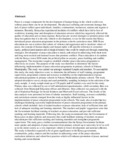| dc.description.abstract | Peace is a major component for the development of human beings in the whole world over, without peace there can be no development. The physical suffering and economic damage that lack of peace inflicts upon individuals, families, communities, businesses, nations and regions is immense. Recently, Kenya has experienced incidents of conflicts which have led to loss of workforce, learning time and disruption of education services which has negatively affected the quality of education across many regions. Kenya has put several strategies to promote peace with deep recognition that it is the only vehicle to development, it was for this reason that Kenya introduced peace education programme in the primary schools curriculum since 2008.Peace education sets out to redress this culture of violence and aggression and to inculcate values of peace, the concept of human dignity and human rights with specific reference to economic equity, political participation and ecological balance that could be employed through counseling strategies.
Development of peace education is timely and critical in addressing both short term and long-term societal and national issues that promote conflicts. Peace education is in tandem with the Kenya vision 2030 under the political pillar on security, peace building and conflict management. The researcher sought to establish whether peace education programme is effectively on course. The purpose of the study was therefore to determine 'the factors influencing implementation of peace education programme in primary schools in Nakuru Municipality.'The study was carried out amongst standard 8 pupils and teachers.
To accomplish this study, the study objectives were: to determine the influence of staff training, programme supervision, programme content and resource availability on the implementation of peace education programme in primary schools in Nakuru Municipality primary schools. The study adopted descriptive survey design and used probability sampling technique in the selection of the study sample. A study sample made up of 138 pupils and 45 teachers was used for the study. Primary data was collected by use of self administered questionnaires, while secondary data was collected from Municipal Education offices and libraries. Data collected was analyzed with the aid of Statistical Package for Social Sciences and Microsoft Excel software.
The results of the data analysis were presented in form of tabular summaries. Staff training, resource availability and curriculum content emerged from the study as highly influential factors in the implementation of peace education programme in the schools. The study also revealed the key challenges hindering successful implementation of peace education programme in the primary schools which included: lack of trained teachers on peace education, lack of sufficient time and lack of adequate teaching and learning materials. The teachers and pupils' suggestions were that the Government facilitate training of teachers on peace education; and provide sufficient teaching and learning materials.
Following this, the study recommends that, the Government of Kenya puts in place policies and measures that could facilitate training of teachers on peace education provide sufficient teaching and learning materials and strengthen programme supervision. The study gave a further recommendation that the Kenya Government facilitate more uptake and adoption of peace education from primary schools up to university level as well as in the entire society as a very important vehicle to foster development and national cohesion. The study is therefore expected to be of great significance to the Kenya government, communities, policy makers and the teachers in addressing some of the peace education curriculum initiatives and school best practices which will enhance promotion of peace, national healing and reconciliation. | en_US |

